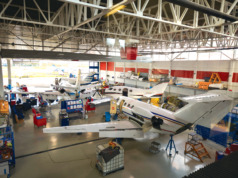
While your flight logs and aircraft maintenance records likely are in the capable hands of your flight crew, you should understand the importance of these records, and the risks you take – legal, financial, and safety – if they are incomplete, inaccurate, or missing.
The Flight Log
Most aircraft have a recording device embedded in an electronic control unit, or a simple electronic “Hobbs” meter, which measures the time the aircraft is in use, with engines running. However, the declared legal aircraft total time and landings are recorded in the flight log by the pilot, using the honor system. When the aircraft is delivered new with an airworthiness certificate, it receives a flight log, either paper or electronic. The pilot records every destination leg flown point to point, capturing hours and landing on each leg. Some flight logs record mechanical discrepancies and corrective maintenance actions as well.
The Maintenance Records
Every aircraft is built to certain requirements established by its country of origin’s governing aviation authority, such as the FAA or the European Aviation Safety Agency (EASA).
Once all the requirements are met, the aviation authority issues a type certificate (TC) specifically for that model, which allows it to go into production. Every aircraft then must be built to the same blueprint and requirement to be in compliance with the TC.
In order to maintain airworthiness, the aircraft must conform to the original TC at all times after production, proven via inspections, service checks and established life limits on critical safety of flight parts. The aircraft owner is responsible for maintaining and retaining these records until the next inspection or check, or until the part is replaced.
The aviation authority also issues Airworthiness Directives (ADs or AD notes). The aircraft is not legally airworthy unless it complies with all ADs issued to it. These ADs are similar to service bulletins for cars, which notify the owner of a hazard or safety condition that must be monitored or corrected.
Every inspection, time remaining or life-limited component, and AD must be recorded by time and date accomplished, and any recurring inspection requirement noted.
Why are these records important?
- To Ensure Public Safety – FAA and EASA inspectors perform random periodic surveillance, by reviewing records for all aviation operations. Any violation, such as a missing inspection or an AD not complied with or overflown, can result in a heavy fine or even grounding of the aircraft.
- In Case of Incident or Accident – Whether inflight or on the ground, these records will be thoroughly examined by the aviation authority and the adjuster for the hull insurance carrier.
- Insurance – If there are any questionable or missing inspection entries, or if a critical life limit component is overdue, the insurer has the right to deny the claim as the aircraft is not considered airworthy at the time of the incident.
- Hourly Cost Maintenance Program – If your aircraft is covered under an engine or airframe extended warranty program, the contract will require that records be monitored carefully for accuracy, and that the aircraft is legally airworthy.
- Selling the Aircraft – Prior to sale, the flight log will be reviewed to determine accuracy of the time recorded, and to understand where the aircraft flies or frequently parks. A thorough inspection will check the weight and balance records and verify that equipment installed matches the records. The maintenance records are compared to the inspection requirements, and ADs and service bulletins for compliance. Any gaps are a red flag that the aircraft is poorly managed or that the seller may be hiding something.
Your Director of Maintenance or Chief Pilot knows how important good recordkeeping is to the well-being of your aircraft operation, and will keep the records up-to-date, stored in a fireproof cabinet, and ready for your inspection whenever you ask. BAA
George Kleros, Senior VP, Advisory Services for Jet Support Services, Inc. (JSSI), has more than 30 years of experience in Aviation Maintenance, Management, and Field Support Services for business jet aircraft.





